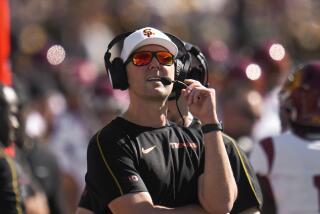Nothing Special About Purdue Performance
- Share via
Painful as it was, Purdue long snapper Tim Stratton didn’t even try to sidestep the truth. His botched snap hurt the Boilermakers in a big way.
“Basically, when it came down to it, I screwed up,” said Stratton, who sent the ball screaming over the head of punter Scott Kurz in the first quarter. Kurz recovered the loose ball for a 30-yard loss. Washington took over at the Purdue 25, and, three plays later, scored for a 14-0 lead.
“The coaches say I put too much velocity on it,” Stratton said. “I kind of pride myself on getting the ball back there fast. It was a perfect spiral.”
Little did he know Purdue’s special-teams units would be in a downward spiral all game. The punt coverage team was flagged three times for interference; and Purdue kicker Travis Dorsch was wide left on a field goal attempt in the fourth quarter that would have kept the Boilermakers in the game.
The impact of the breakdowns?
“They bit us in the butt,” Stratton said.
Stratton had been the Boilermakers’ savior, taking over punt-snapping duties at midseason from John Shelbourne, who turned every snap into an adventure. Shelbourne lost his job after a three-game stretch in which his errant snaps--and the protection blunders of other players--led to two punts being blocked by Notre Dame, one by Minnesota, and two attempts against Penn State that Kurz simply pounced on rather than even trying to kick.
Monday, there were plenty of special-teams mistakes to go around.
The Boilermakers received three penalties for crowding Washington punt returner Toure Butler, who was entitled to a two-yard cushion in order to catch the ball.
Purdue Coach Joe Tiller said he would rather watch his players draw a five-yard penalty than see Butler tearing downfield on a return.
“It was a conscious effort on our part to cover this guy up, because he does not fair catch,” Tiller said. “If you study your opponent through 11 games, you know that. So for us to lack aggressiveness in coverage would have been a huge mistake.”
Turns out, the Boilermakers might have been looking at the wrong game film. Washington does not compile season-long statistics on fair catches, but according to Sports Information Director Jim Daves, Butler waves off returns as much as the next guy.
Tiller might have been thinking of former Husky returner Joe Jarzynka, who finished his career a year ago. During the 1998 season, Jarzynka had a reputation for never fair catching.
“But last season, [Coach] Rick Neuheisel told Joe he had to start fair-catching some of those punts,” Daves said.
Regardless, the Boilermakers were penalized for the infractions, but their problems weren’t over. With 4:54 to play and Purdue trailing, 34-24, Dorsch hooked a 42-yard field goal try and his team’s momentum evaporated into the night air. “I missed it,” Dorsch said with a shrug. “You prepare, you do your best when the time comes, but sometimes you don’t succeed. It can be a little hard to take, but you just look toward the next kick.”
He wouldn’t get the chance. The Huskies took over at their 25 and ran out the clock.
“The field goal miss hurts, obviously, because then you cut it to a one-touchdown game,” quarterback Drew Brees said. “Then we’re kicking off to them. Who knows, maybe we might kick an onside kick and get it, drive down, score, go into overtime. You never know what might happen.”
In the end, the Boilermakers were left to dream about what might have happened . . . and try to forget the things that did.
More to Read
Go beyond the scoreboard
Get the latest on L.A.'s teams in the daily Sports Report newsletter.
You may occasionally receive promotional content from the Los Angeles Times.











